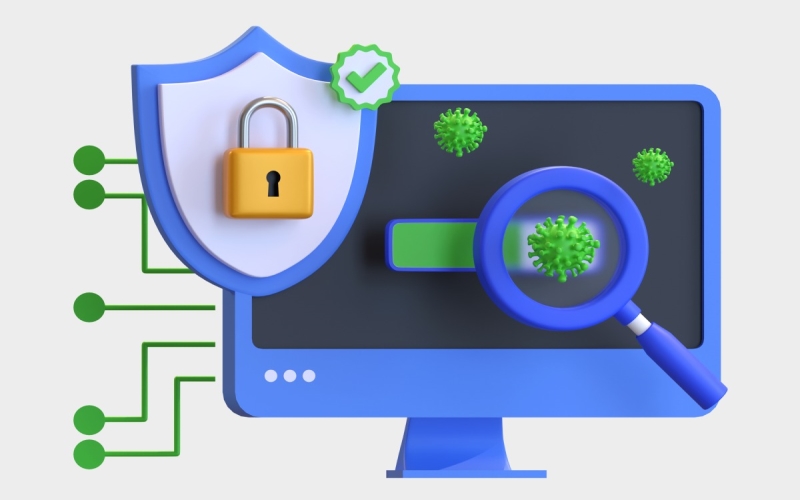While some folks broadcast their lives on YouTube, Twitter, or Instagram, others would rather keep it private and hidden. Some want to be anonymous online, so they search for tools that promise anonymity.
Now, one of those tools is a VPN.
One of the claims you’ll come across on most VPN providers – apart from being the “best” or the “fastest” is that they’ll make you anonymous on the internet.
It’s undoubtedly a big claim, but is it true? That you visit websites, watch videos, and download files without anyone knowing who you are?
Now, the answer can be yes and no – there’s no denying that a VPN helps hide your online activities, but still, you can reveal your identity in different ways that even your VPN won’t protect you.
Therefore, it’s important to understand how a VPN works and protects you online. So, how does a VPN protect you online?
How a VPN Provides Privacy
Having a VPN elevates your privacy online than without – once the connect button is pressed in your VPN, your device’s connection is encrypted. This implies that your identity is masked, and nobody can see your activity.
A VPN acts as an intermediate medium between you and the web therefore, a lot of data is encrypted, safeguarding your privacy. But what exactly does a VPN do?
Here are some of the things that a VPN hides:
IP Address
A VPN ideally alters your real IP address and provides you with a new IP address from its database. It’s how you merely become invisible online.
Here’s how it works: Internet communication usually depends on exchanging IP addresses. Your real IP address can reveal your true details like city, ISP, region, and country. Perhaps that might not be enough to tell your location and physical address exactly, but snoopers anyone spying on you can know your country or region.
Moreover, your ISP, online apps, governments, and even the websites you visit will be able to track everything that you do online once they have your IP address. Through your IP address, snoopers can come up with a personalized digital profile that tells everything about you. That information can be used for targeted apps or even spam.
Fortunately, a VPN can help mask your real IP address, which will help stop online tracking.
Protection Against Censorship
Some repressive governments across the globe restrict their citizens from accessing the free open internet space. However, a VPN conceals your real location, and you can easily bypass the restrictions. All you need to do is connect to a server in a different country, and anyone snooping on you will see that you’re connected from that country and not your physical country.
Of course, governments are aware of VPN usage and try to block access to most VPN servers as much as possible. Fortunately, VPN providers also work hard to counter such blocks with obfuscation technologies. Therefore, before settling for a VPN, you should pick the most reliable and secure VPN, like ExtremeVPN.
The best thing about spoofing your location is that it allows you to bypass geo-restricted content on some apps and websites. You can watch your favorite TV shows or movies from anywhere. Also, it will help you avoid online shopping price discrimination, whereby services and websites show different prices of the same item based on location.
Encrypts Your Data
Malware attacks, data breaches, and other online threats expose your information. Through encryption, all the data you transmit will be seen only by your intended recipient. That means that your online activity and personal information are protected from attackers and snoops that might be trying to intercept your traffic.
A VPN uses a tunneling process and an impenetrable 256-AES-bit encryption to add an extra layer of security. Even the smartest and fastest computers will find it difficult to crack such encryption.
It Ensures You’re Safe on Public Wi-Fi
A VPN encrypts all your data between the VPN server and your device. It prevents anyone from trying to intercept the Wi-Fi network connection that you connect. Hackers mostly abuse public Wi-Fi hotspots, but HTTPS has slowly reduced the dangers. We’re not out of the woods yet.
Unfortunately, DNS poisoning or DNS spoofing still is a risk, given that DNS requests are often sent unencrypted to your ISP. Therefore, that’s where a VPN is helpful – it protects you against routing all the DNS requests via an encrypted VPN tunnel to be resolved by its DNS server.
So, does a VPN make you anonymous?
A VPN will only increase your anonymity online, but the moment you sign in to the service, you’ll lose anonymity.
So, Why Are You Not Anonymous While Connected to a VPN?
Here’s something you need to understand: the moment you sign into a site, you instantly reveal who you are to that website. Therefore, it means that you’re not anonymous when you browse. Ideally, it’s more like walking into a shop across the street wearing a badge with your address and name written on it.
Some websites will ask you to provide only your email when creating your account with them, and in such a scenario, you’ll not give out your address and name; therefore, with only your email, the site will only know that it’s you given that it’s your email that has signed in.
Unfortunately, most websites require you to provide your name, gender, address, date of birth, and even payment information. In that case, when you enter your account, the website will have a clear picture of who you are.
That’s how sites track all your online activities and even be able to offer targeted ads. However, if you simply browse the services or sites without logging in, chances are that your website won’t be able to know you and can only track the activity and maybe come up with a profile based on your location and IP address.
Now, that’s where a VPN comes in – it will help you to eliminate tracking from sites and hence won’t build a profile of you. Ideally, this is what it means – if you browse without signing into a website while connected to a VPN, your website won’t know your location or real IP address, and that’s how you become totally invisible.
It’s a similar logic that applies to Google; if you use Google search without signing into your Google account and you connect to a VPN, then Google will have no idea who you are and your location.
If you sign into your Google account and use a VPN, Google will have no idea of your location as they’ll see your VPN’s IP address. However, Google can still guess your location given that it knows it’s you as you’re signed into your account – it’s one of the biggest clues.
So, what should you do? Should you delete your Google account?
Deleting your Google account is a personal decision, but it might not be necessary. Most services are intertwined with Google, and deleting your Google account means you might be unable to access such services as Google Meet, Gmail, and others.
Fortunately, there are some measures you should consider before going to the extreme of deleting your Google account. For instance, you should ensure that you delete and turn off all your Google activity. Also, consider creating a burner account that you can use to sign into Google, which doesn’t involve your real personal information. Lastly, you need to be proactive and never sign into everything.
If you want to delete your Google account strictly, consider alternatives like DuckDuckGo and email services such as ProtonMail.
Privacy vs. Anonymity
Regarding VPNs, several terms like privacy, anonymity, and privacy are similar. However, the truth is that being private is not similar to being anonymous.
For instance, if someone’s private, it means that one’s aware of their existence and that they just don’t know something about them. On the other hand, when someone’s anonymous, it means that even their existence is totally a secret.
Therefore, becoming private online is achievable because you can hide all your internet activity, remove digital identifiers from apps and websites, and protect your personal information. Unfortunately, becoming completely anonymous might only be achievable if you decide not to use the internet.
Conclusion
A reliable VPN is your first step to your privacy online. However, realistically speaking, there’s nothing like an anonymous VPN. A VPN offers invaluable security and privacy from online tracking, surveillance, data collection, hacking attempts, ISP monitoring, targeted advertising, and censorship law.
Besides, it’s significant to remember that your VPN just replaces your ISP regarding what it can see. Furthermore, unlike your ISP, a VPN is designed to protect your privacy, but you must choose a VPN that you can trust. ExtremeVPN is a trusted VPN with several aspects that you’ll find beneficial.

